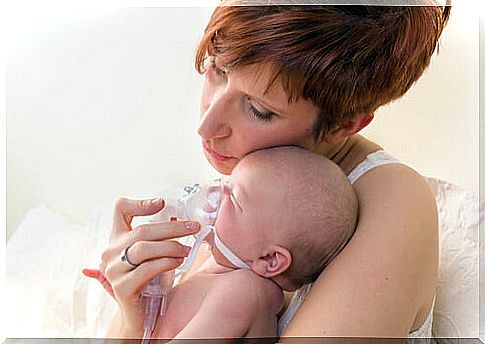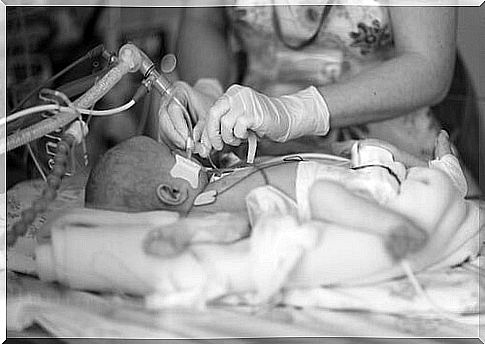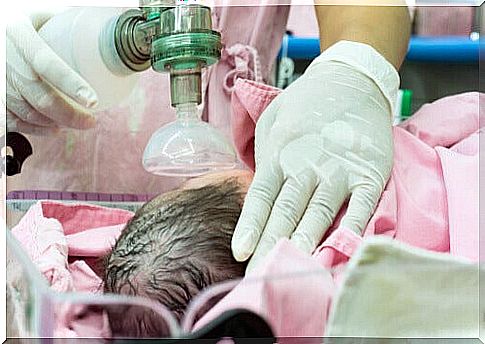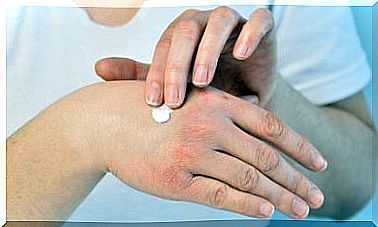Most Common Respiratory Illnesses In Newborns
Respiratory illnesses are common and can be very dangerous in newborns. Identifying and treating them right away can save lives.

Respiratory diseases in newborns are quite common and must be evaluated and treated in time to avoid major complications.
The lungs are the last organ to develop in the fetus before birth, so they are susceptible to major problems. If the baby is born prematurely, the lungs may not be fully developed and are more exposed to risk factors.
There may also be genetic factors that cause breathing problems in newborns. Other causative factors can be complicated deliveries in which the baby’s blood circulation is reduced or infections that are contracted after birth.
In all cases, treatment is key because respiratory diseases can have serious consequences and are one of the main causes of death in newborns.
What are the symptoms of respiratory diseases in newborns?
The main symptoms that doctors try to identify immediately after delivery and in the days after are:
- Lack of breathing
- Shallow breathing
- Arrhythmic breathing
- Snoring when breathing
- Excess mucus.
- Pulmonary retraction.

Most frequent respiratory diseases
The types of respiratory diseases that newborns can contract are very varied. The main ones are:
Apnea
It occurs when the baby stops breathing for periods of around 20 seconds. It usually develops when the lungs have not matured enough.
When there is apnea, the baby’s pulse may decrease. Bradycardia or slow heart rate and discoloration or blueing of the skin known as cyanosis can occur.
It is common in children who are born by cesarean section and / or prematurely. This complication usually goes away in less than 24 hours when the baby is given oxygen.
Pneumonia
The Premature babies have a high percentage chance of developing pneumonia because their lungs are not developed to the whole.
Meconium, which is the first stool that the baby expels, sometimes while it is still in the mother’s womb, can be aspirated by the baby during delivery. This can cause an infection leading to pneumonia.
Respiratory distress syndrome
This condition is also more common in premature babies, especially those born between 36 and 39 weeks of pregnancy.
At this stage of the baby’s formation , surfactant has not yet been produced, which is a substance that protects the lungs and helps them inflate with air without pressing the alveoli. This can cause a lung collapse.
Bronchopulmonary dysplasia
This is a complication that is not innate to the baby. It is acquired by the treatments given when the baby is premature. Giving your baby oxygen, while necessary to save his life, can damage his delicate lungs. If this happens, the baby may have trouble breathing.
Pneumothorax
It occurs when, at birth, there is air between the lung and the chest, causing pressure on the newborn. When this condition occurs, the baby has bluish skin and breathing problems, so it must be treated immediately by inserting a catheter that helps to remove the air that is trapped.
Other respiratory diseases
There are other less common but just as serious lung or airway complications:
- Congenital bronchiectasis: It is an inflammation of the airways caused by an infection.
- Pulmonary hypoplasia: it is a congenital anomaly characterized by the arrest of lung development.
- Congenital pneumonia: it is an inflammation of the lung tissue not caused by infections.

Can respiratory diseases of the baby be prevented?
Respiratory diseases are difficult to predict and prevent. Therefore, it is advisable to follow the following tips during pregnancy:
- Comply with all medical check-ups recommended by the doctor.
- Maintain a healthy diet.
- No Smoking.
- Avoid drinking alcohol.
- Do not use drugs.
In any case, maintaining a healthy pregnancy helps prevent premature delivery and lowers the risk that the lungs are not fully developed.









